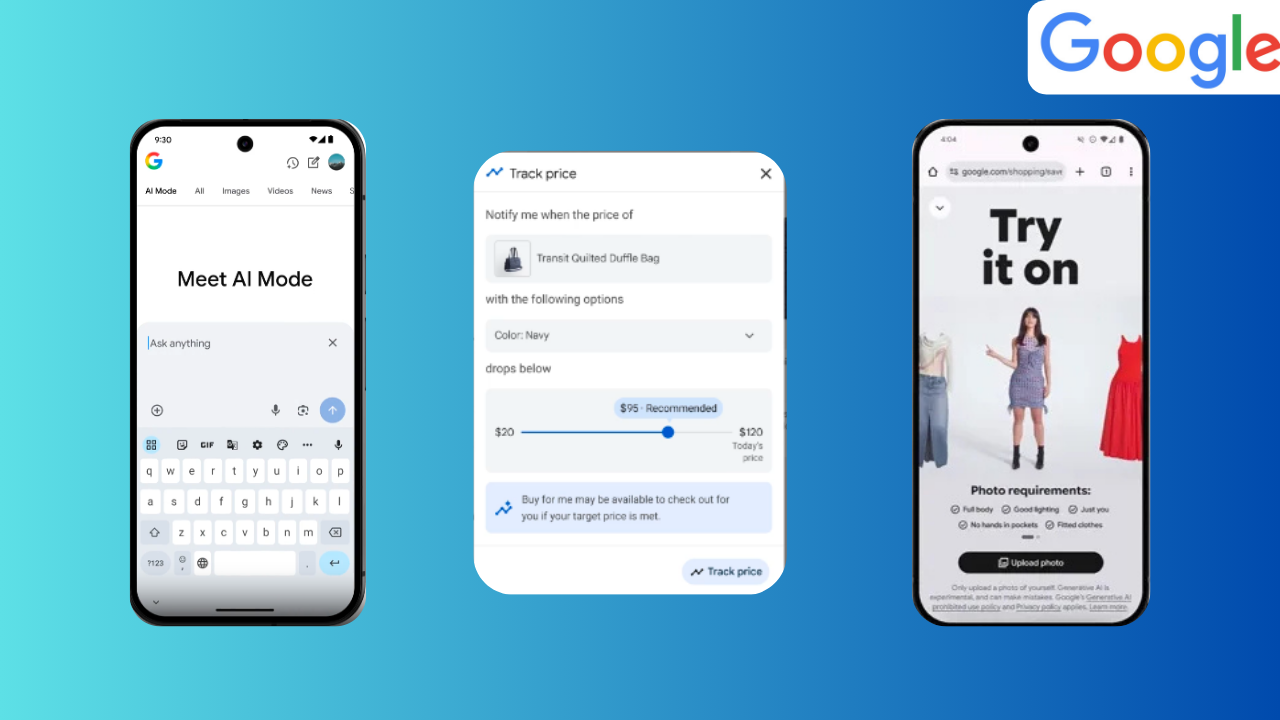Google introduces AI Mode, Agentic Checkout & Virtual Try-On at I/O 2025

Google has revealed a sweeping set of updates at its annual I/O developers conference, with a focus on generative AI, immersive shopping, ad tech innovation, and transformative search capabilities, all of which hold significant implications for digital marketers.
Among the standout announcements were several enhancements to Google Shopping, designed to create a more intuitive and personalised customer experience. Central to this is a new “AI Mode” that will soon be available in the U.S., offering users an advanced way to search for products using conversational prompts and refined visual suggestions.
“Say you tell AI Mode you’re looking for a cute travel bag,” said Google in its announcement. “It understands that you’re looking for visual inspiration and so it will show you a beautiful, browsable panel of images and product listings personalised to your tastes.”
The system then initiates a “query fan-out” to filter suggestions based on context, for example, suggesting waterproof bags with ample storage if travelling to a rainy destination.
A new “agentic checkout” feature will further enhance online purchasing, enabling users to set alerts for price drops and even allow Google to complete purchases automatically once conditions are met. Preferences such as size, colour, and budget can be specified in advance.
/socialsamosa/media/post_attachments/a0195482-088.png)
Google is also advancing its virtual try-on tools. Leveraging a proprietary image generation model, the tool can now overlay clothing on user-submitted photos with photorealistic accuracy, capturing material behaviour and fit based on individual body types. This feature is now live in Search Labs in the U.S.
/socialsamosa/media/post_attachments/4916edbd-2c9.png)
In another development with potential marketing applications, Google is rolling out advanced translation within Google Meet. The update enables near real-time translation of spoken language while preserving the speaker’s tone and vocal characteristics, opening doors for more natural multilingual communication.
A new product, Google Beam, was also unveiled. Described as a “3D video communications platform,” Beam captures scenes using six cameras and reconstructs them into a 3D lightfield display, enabling immersive face-to-face interaction in virtual space. The product is being developed in partnership with HP and is expected to reach select early customers later this year.
On the search front, Google introduced “Project Mariner,”its latest Gemini chatbot integration, which enables deeper web search functionality and task automation. A new AI Mode within Search allows for more sophisticated reasoning and complex query processing.
Among the AI Mode capabilities is “Deep Search”, which Google says can “issue hundreds of searches, reason across disparate pieces of information, and create an expert-level fully-cited report in just minutes.”
/socialsamosa/media/post_attachments/cbd3a24f-a98.png)
Multimodal search, another key addition, will allow users to interact with visual elements in real time, using mobile cameras to ask questions about what they see, bringing an even more intuitive dynamic to search.
Google also previewed generative content upgrades, with Gemini set to process files from Google Drive and Gmail to create reports, infographics and documents. New iterations of its Imagen 4 and Veo 3 models will enhance image and video generation quality.
A new content creation platform named “Flow” was introduced as well, offering creators the ability to produce full AI-generated films using Google’s suite of visual generation tools.
In a nod to the future of virtual representation, Google teased the development of AI avatars, which could become key for use cases such as livestream shopping, education, or digital customer service.
Finally, Google announced it is working with eyewear brands Gentle Monster and Warby Parker to produce AR glasses. These will offer AI integration in a stylish, everyday format as part of Google’s broader push into smart wearables.
With so many tools on the horizon, marketers are being urged to pay close attention to how these updates could affect search visibility, e-commerce strategies, content production and audience engagement in the AI age.
News